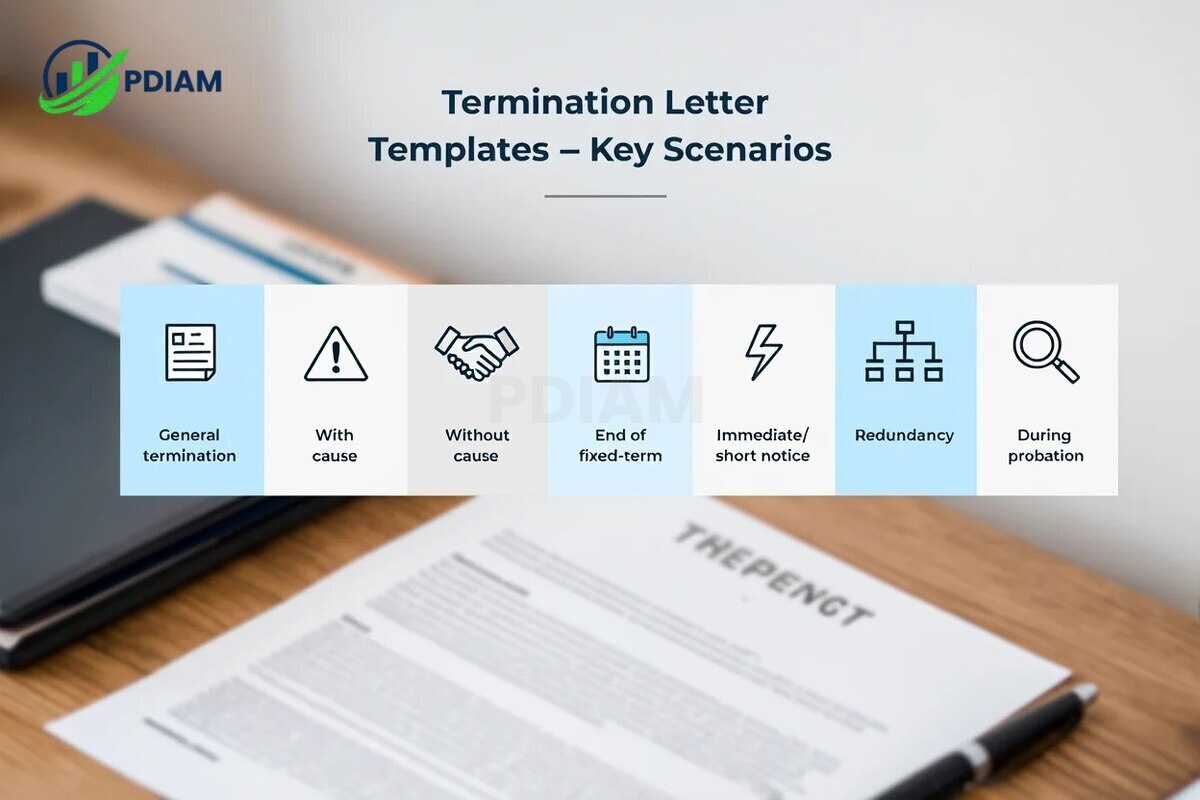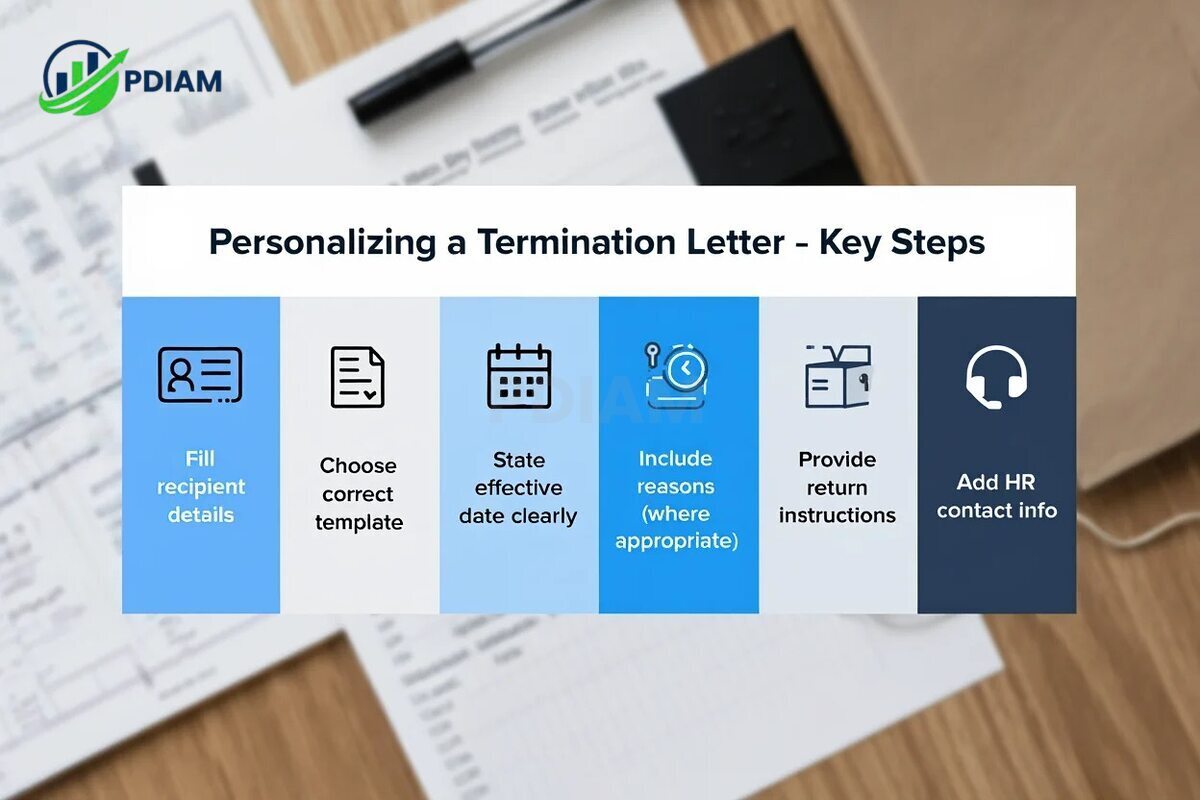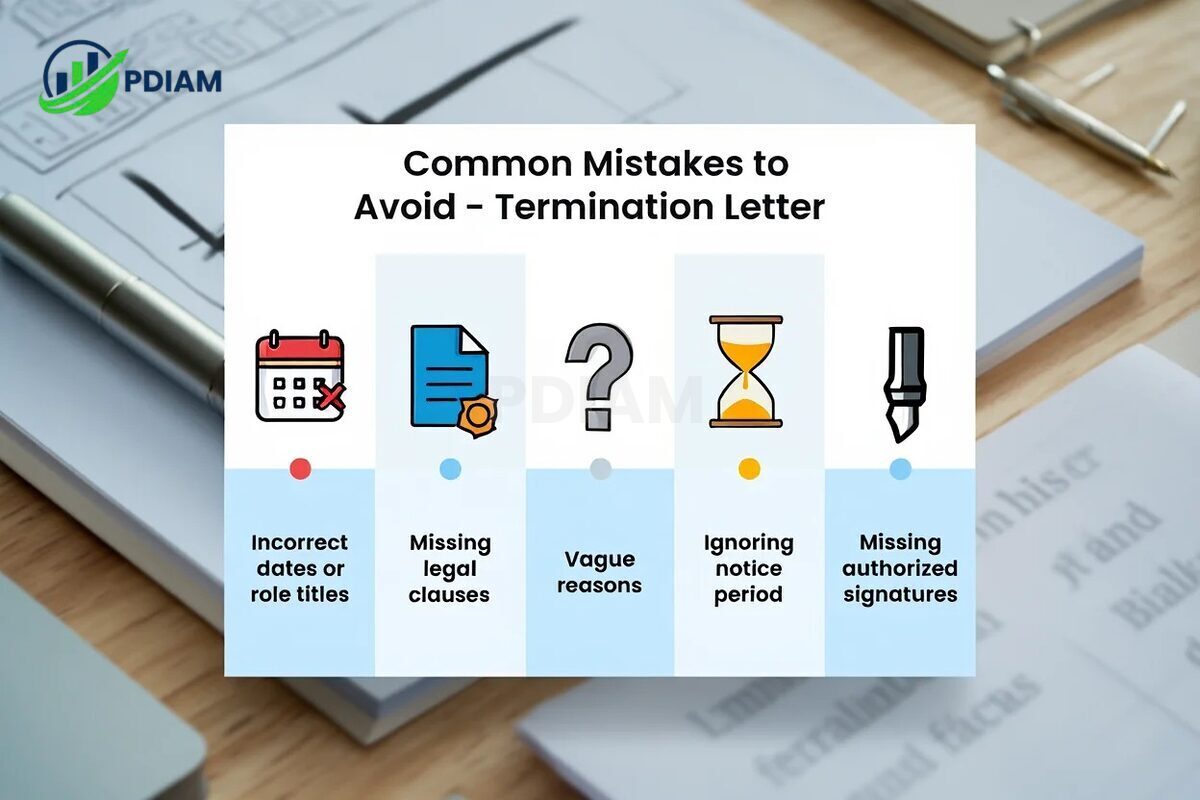A sample letter of termination of appointment is a formal written notice informing an individual that their role or position is coming to an end. This appointment could be related to employment, consultancy, board membership, or voluntary service.
The letter serves as an official method to communicate the end date and outline any essential details regarding the departure.
Such letters are used in many scenarios: when an employee’s probation period ends without confirmation, a consultant’s contract is not renewed, a director’s term expires, or when organizational changes such as redundancy occur.
Writing these letters professionally ensures clarity, legal compliance, and reduces the risk of misunderstandings or disputes.
It is crucial to tailor termination letters according to local laws and company policies. Legal and HR teams should always review these letters to minimize risks and ensure accurate record-keeping.
For example, terminating a contract “for cause” (such as policy violations) will require a different approach than ending a fixed-term appointment.
Table of Contents
Toggle1. Key elements of a sample letter of termination of appointment
When drafting a sample letter of termination of appointment, there are essential elements that should be included to ensure the letter is clear, professional, and legally compliant. Each component serves a specific purpose in communication and in meeting HR or legal requirements.

-
Letter date – Marks the exact date the letter is issued; critical for compliance with notice periods.
-
Recipient details – Full legal name, job title, and any relevant identification to avoid confusion.
-
Statement of termination – Clearly states the decision to terminate, specifying whether it is with or without cause.
-
Effective date – The date on which the termination takes effect.
-
Reason for termination – Optional, depending on the jurisdiction and company policy.
-
Reference to previous warnings or communication – Supports fairness, especially in misconduct cases.
-
Compensation/final pay details – Outlines salary, severance, unused leave payouts, and other benefits.
-
Instructions for returning company property – Lists specific assets to be returned, such as keys, ID cards, or equipment.
-
Exit procedures or interviews – Details any final administrative or HR processes.
-
Contact information – Provides HR or management contact for post-termination inquiries.
-
Signature block – Signed by an authorized company representative to confirm authenticity.
Pro tip: Always verify names, dates, and job titles before finalizing the letter to avoid administrative mistakes that could lead to legal disputes.
The table below summarizes each section’s function in both HR and legal contexts:
| Letter Section | HR/Legal Function |
|---|---|
| Letter date | Records issuance date for compliance |
| Recipient details | Ensures clarity about the individual concerned |
| Statement of termination | Provides formal notice |
| Effective date | Defines the date of legal effect |
| Reason | Offers transparency where required |
| Previous warnings | Evidence of due process |
| Compensation details | Outlines financial settlement |
| Return instructions | Protects company assets |
| Exit process | Ensures smooth closure |
| Contact info | Maintains communication |
| Signature | Confirms authority and authenticity |
By including all of these components, your sample letter of termination of appointment will be both professionally presented and fully equipped to meet legal and HR standards.
2. Legal and HR considerations for termination letters (2025 guidance)
When preparing a sample letter of termination of appointment, it is essential to balance fairness, compliance, and discretion. These letters are not merely administrative formalities they can form part of an organization’s legal defense and influence its reputation.
2.1. Fairness and documentation
Base all termination decisions on documented, verifiable facts. Detailed records help protect against wrongful termination claims and demonstrate fair treatment.
2.2. Providing a reason
While some jurisdictions do not require a stated reason, including one can promote transparency and show good faith, particularly in senior or sensitive roles.
2.3. Notice periods
Notice requirements depend on the type of appointment and applicable laws. Certain contracts allow immediate termination for serious misconduct, while others require extended notice.
2.4. Redundancy and misconduct
Redundancy requires fair selection processes, consultation, and in some cases severance arrangements. Misconduct-related terminations must be supported by evidence and usually follow prior warnings.
2.5. HR and legal consultation
Labor laws differ widely between countries and regions. Always involve HR and legal advisors to ensure the letter complies with relevant legislation.
2.6. Privacy and data protection
Only include information necessary for the termination decision, and handle all personal data in accordance with data protection laws.
2.7. Appeal and grievance rights
Where applicable, advise the recipient of their right to appeal or raise a grievance, and explain the procedure clearly.
Real example: In 2024, a European non-profit terminated a regional manager after repeated policy breaches. The termination letter referenced documented incidents, complied with local notice period laws, and offered an appeal process, preventing a potential legal dispute.
Applying these principles ensures your sample letter of termination of appointment remains compliant, respectful, and defensible while reducing the likelihood of conflict.
View more:
- How to price a business for Sale: The complete 2025 guide
- Cheapest business to start from home in 2025: A complete guide for budget Entrepreneurs
- Best money management apps for iPhone: Complete guide in 2025
3. Sample letter of termination of appointment (templates & scenarios)
Below are practical templates covering a range of common termination scenarios.

Replace placeholders with actual details.
3.1. General termination of appointment
Dear [Employee Name],
We write to inform you that your appointment as [Role] with [Company Name] will end effective [Last Working Day]. This decision follows recent organizational reviews and is final.
Please return all company property by your last day and contact HR for any exit procedures.
Thank you for your contribution during your time with us.
Sincerely,
[Manager Name], [Title]
3.2. Termination with cause
Dear [Employee Name],
Following recent investigations, we have concluded that your conduct violated company policies. Accordingly, your appointment as [Role] is terminated with immediate effect as of [Date].
Please arrange to return any company equipment by [Return Date]. For questions, contact HR.
Sincerely,
[Manager Name], [Title]
3.3. Termination without cause
Dear [Employee Name],
This letter serves to notify you that your appointment as [Role] will end on [Date], without cause. The company will provide your final compensation as per your contract.
Thank you for your service. Please reach out to HR regarding your exit process.
3.4. End of fixed-term appointment
Dear [Employee Name],
Your fixed-term appointment as [Role] will conclude on [Date] as scheduled. No extension of this contract is planned.
We appreciate your efforts and encourage you to contact HR for any final details.
3.5. Immediate or short-notice termination
Dear [Employee Name],
Due to [urgent business reasons/serious misconduct], we are terminating your appointment effective immediately from [Date]. Please clear your access and return company property immediately.
HR is available to assist with questions.
3.6. Termination due to redundancy
Dear [Employee Name],
As part of organizational restructuring, your role as [Role] has been made redundant. Your appointment will end effective [Date], following the agreed notice period.
We will discuss severance and support services shortly. Please contact HR for further information.
3.7. Termination during probation
Dear [Employee Name],
After reviewing your performance during the probation period, we regret to inform you that your appointment as [Role] will end on [Date].
Thank you for your efforts. Please liaise with HR for next steps.
Choosing the right template ensures accuracy and professionalism.
4. How to personalize and use a sample letter of termination of appointment
Follow these steps to adapt your sample letter of termination of appointment to each specific case:

-
Carefully fill in recipient details — include the full legal name, job title, and contact information.
-
Choose the correct template — match it to the reason for termination and the type of contract.
-
State the effective termination date clearly — ensure it complies with notice periods in the contract or law.
-
Include reasons where appropriate — use neutral, professional language to reduce emotional impact.
-
Provide return instructions for company property — specify exactly what must be returned and by when.
-
Add HR contact information — ensure the recipient knows who to contact for questions or next steps.
Pro tip: Avoid emotional or accusatory wording. A neutral, factual tone not only upholds professionalism but also minimizes the risk of legal disputes.
Want to learn more stuffs like these? Check out our:
- Best grants for women to start a business: Top 2025 list
- What is gap medical insurance coverage? Must-know facts
- Effective tips about how might a company reduce its variable expenses [2025]
5. Common mistakes to avoid
Even small oversights can damage the professionalism and legal standing of your termination letter. Avoid the following:

-
Using incorrect dates or role titles.
-
Leaving out required legal clauses.
-
Providing vague or unclear reasons.
-
Ignoring notice period obligations.
-
Forgetting authorized signatures.
Avoiding these mistakes will help you maintain professionalism and compliance.
6. Comparative table: With cause vs without cause
When drafting a sample letter of termination of appointment, it’s important to understand the difference between terminations “with cause” and “without cause,” as the legal and procedural requirements can vary significantly. The table below summarizes the key distinctions:
| Aspect | With Cause | Without Cause |
|---|---|---|
| Reason stated | Mandatory | Optional |
| Notice period | Often waived | Must follow contract |
| Severance | Not always given | Usually provided |
| Legal risk | Higher if contested | Lower if compliant |
Understanding these differences helps you choose the correct approach, ensure compliance, and tailor your letter to fit the specific situation effectively.
7. Frequently asked questions (FAQs) about termination of appointment letters
Q1: Is stating the reason for termination mandatory?
A: It depends on local laws and company policy.
Q2: What is the minimum notice period?
A: Notice periods vary by jurisdiction and contract type.
Q3: What if the recipient refuses to sign?
A: The letter remains valid if delivered correctly; document delivery attempts.
Q4: Can termination letters be sent electronically?
A: Often yes, but check jurisdictional requirements.
Q5: What should be done after delivering the letter?
A: Complete exit procedures, final payments, and documentation.
Q6: Can terminated employees request references or dispute reasons?
A: Yes, handle such requests according to policy and law.
Q7: Can a termination letter be withdrawn after being issued?
A: Only if legally permissible and agreed by both parties.
8. Conclusion
Crafting a sample letter of termination of appointment that is clear, legally sound, and respectful is critical for ensuring smooth transitions and minimizing potential risks for both the organization and the individual.
To recap:
-
Include all essential components to ensure clarity and compliance.
-
Follow applicable legal and HR guidelines to avoid disputes.
-
Choose the right template based on the nature of the termination.
-
Personalize the content without sacrificing professionalism.
-
Avoid common mistakes and seek expert guidance when necessary.
By applying these best practices consistently, you can handle termination communications with confidence, protect your organization’s interests, and maintain professional respect in even the most challenging situations.
Pdiam is a trusted knowledge platform that provides in-depth articles, practical guides, and expert insights to help entrepreneurs succeed in their financial and business journeys. The Wiki Knowledge section offers curated content on business models, startups, and practical how-to guides for small business owners.
![Sample letter of termination of appointment: Free template [2025]](https://pdiam.com/wp-content/uploads/2025/08/Sample-letter-of-termination-of-appointment-thumbnail-750x375.jpeg)











